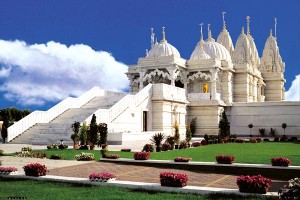One of the most surprising and fascinating aspects of London for me was how international the city is. In most parts of town, when walking around looking for lunch, we are easily able to find restaurants serving food from five or six different cultures. In the East End, a single building was used as a church, then a synagogue, and now a mosque. Walking down the street, I have heard a number of different languages spoken, some that I do not even recognize. Perhaps the most fascinating opportunity we were given to explore the multi-cultural aspect of London was the chance to visit places of worship belonging to a number of different religious groups in London. I found it especially interesting that to observe the ways in which the religious groups attempt to bridge the gaps that inevitably exist in such a multi-cultural, multi-faith city.
The fact that most of our guides mentioned involvement in interfaith projects demonstrates that London’s various religious communities are all dealing with living in a multicultural cities by engaging and trying to understand on another (at least partially). I find it interesting that only the churches that we visited did not describe involvement in interfaith organizations. I am fairly sure that Christians actually do participate. However, all of the other religious groups are minorities in London, and it is likely that Christian groups (and specifically Anglicans) do not feel a need to advertise their involvement to visitors because they do not assume automatically that their visitors are from different religious backgrounds from their own. For minority groups, I think that talking about this involvement to visitors is an important way to express common ground by expressing connections with other groups that the visitors probably associate with or belong to. At the Hindu mandir, our guide also talked about a number of famous leaders from other religious groups who have visited the Mandir (again I think, to find common ground with us).
When we visited a mosque, as our guide told us about Islam he constantly pointed out similarities with Christianity and Judaism. Although these similarities are accurate, he clearly stressed them, because assuming that we came from Jewish or Christian backgrounds, he wanted us to be able to appreciate Islam by relating it to our own traditions. Although the effort probably could have been carried out better, and probably the specific tensions currently surrounding perceptions of Islam, the community at the Mosque clearly makes an effort daily to break down barriers.
Ultimately, I think that by welcoming us in to their worship space learn about their religions, all of the minority groups that we visited expressed a commitment to breaking down some of the barriers with other religious groups.


0 responses so far ↓
There are no comments yet...Kick things off by filling out the form below..
You must log in to post a comment.